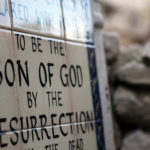We run our website the way we wished the whole internet worked: we provide high quality original content with no ads. We are funded solely by your direct support. Please consider supporting this project.
Memorial Day
For Memorial Day, we thought we would repost Greg’s thoughts from 2007. In this post, Greg expresses his conflicted feelings over this holiday and gives a brief defense of Christian pacifism.
***
Hope you all had a happy Memorial Day. (Isn’t that something of a misnomer — a happy time remembering people killed in war?)
Memorial Day honestly leaves me conflicted.
On the one hand, I am very happy I live in a country where I’m free to engage in my own “pursuit of happiness” (as in “Life, Liberty and the Pursuit of Happiness”). I also appreciate the fact that I live in a country where the governed people get to choose (to some degree) who governs them. For all its flaws, I think democracy is better (though not more scriptural) than dictatorship. And I can’t help but appreciate the young men and women who have laid down their lives to protect this way of life. I benefit from their sacrifice, so it seems appropriate to remember them.
On the other hand, my Lord’s words and example have taught me that it’s better to love your enemy, do good to them, pray for them, and bless them than it is to ever kill them. I’ve been taught to never retaliate but to always return evil with good. I’ve been taught that violence is cyclical, and that if you live by the sword you’ll die by the sword. By submitting myself to this teaching, I’ve come to actually see its wisdom and beauty. I’ve come to see the taking of human life as demonically arrogant – demonic, because it expresses hopelessness in another, which is the opposite of love (I Cor. 13:7), and arrogant, because only the giver of life can justifiably take it.
To be honest, I’ve now come to see war as sheer insanity, and every fiber of my being revolts against it. I’ve gotten to the point where I’d rather die than participate in any of this, for any reason. And I grieve for all who do participate in it, for any reason. The fact that I personally benefit from some of the killing, because some of the killing is (at least is theory) supposed to protect the “American way of life,” doesn’t alter this assessment. Jesus is my Lord, not the American way of life. My allegiance is to the Kingdom of God. (And, in any case, as a white person I continue to “benefit” from the often barbaric and dishonest conquest of my ancestors over the American Indians and the enslavement of blacks — but this doesn’t mean I should approve of it).
I know some readers will immediately wonder, “But what about Hitler? This sort of thinking would let evil take over the world,” etc. Some may in fact experience outrage at my (Jesus’) suggestion that violence is never appropriate for Kingdom people. Some may see it as positively un-American and cowardly! In response, I’ll simply say six brief things:
1) I totally understand and even empathize with the objection, and the outrage. But Jesus’ way of life is SUPPOSED TO BE scandalous to the world. The earliest Christians refused to fight in wars to defend the Roman empire and refused to pledge allegiance to the Roman empire. And this was one of the reasons they were despised and martyred. I think this is how it’s SUPPOSED to look.
2) To act on the fear of evil taking over by killing one’s enemies rather than doing good to them is to simply say that Jesus was wrong and to reject him as Lord in this area of our life. This is not what a faithful disciple does.
3) We who have committed our lives to Christ are called to be faithful, not practical. Jesus’ choice to die rather than defend himself with violence is our example, and his choice certainly didn’t look practical on Good Friday.
4) The notion that we can “save the world” or “fix the world” through violence is the a lie that has fueled almost every war – and it has never, in the long run, worked. Every attempt to save or fix the world through violence simply ensures that violence will raise its ugly head again in the near future.
5) The idea that we can and must “save the world” or “fix the world” through violence is predicated on a mistrust of God’s providence. Do we believe in the providence of God or not? Whether we obey him when it seems impractical to do so reveals our faith — or our lack of faith.
6) I grant the obvious — that this world is the kind of world where it seems that violence is necessary. Common sense usually sides with the violent. But Kingdom people are called to manifest a different world: a world in which God reigns; a world that reflects the character of the loving savior rather than the vicious roaring lion. No wonder the New Testament tells us we’re supposed to be fools.
So yes, memorial day leaves me conflicted. I want to stand in solidarity with those who have lost loved ones in wars defending the American way of life. I want to respectfully acknowledge the depth of their sacrifice and acknowledge that I personally benefit from their sacrifice. But I also want to revolt against the demonic arrogance of violent-tending tribalism, manifested on all sides of any war, that makes bloody wars seem unavoidable. I want to scream, “There is a much better way to live. It’s the way of Jesus. It’s the way of self-sacrificial love. It’s the way of non-violence.”
God bless the families of our fallen soliders. God bless the families of the soldiers on the other side. God bless the families of the innocent victims caught in the cross fire. And God bless all of us by influencing our leaders to end this war, and every potential future war. Maranatha.
Category: Essays
Tags: Essay, Jesus, Kingdom Living, Non-Violence, Pacifism, Self-Sacrificial Love, Soldiers, War
Topics: Enemy-Loving Non-Violence, Ethical, Cultural and Political Issues
Related Reading

Peaceworks
We’re excited about an upcoming video series by Peaceworks, a new youth movement for peace. It will inspire you and give you the tools you need to make a difference in your life and the world. Watch the trailer to find out who the speakers will be (spoiler alert: one of them is Greg) or visit…

Podcast: Who is Allowed to Kill and Who Isn’t?
How could it have been ‘just’ to Kill Hitler but also not something a Christian should do? Greg wrestles with non-violence in a world where God uses the violence of others for his own will. http://traffic.libsyn.com/askgregboyd/Episode_0360.mp3

The Cost of Holding On
Given Greg’s recent Twitter comments on the question of how we view what we own, we thought this article in the New York Times was particularly timely. What is the cost of holding onto things? As we accumulate more and more possessions, do we pay a price beyond the actual price tag? Although this piece…

Jesus, the New Israel
The Gospels present Jesus and the Kingdom he inaugurated as the fulfillment of Israel’s story. For example, Jesus’ birth fulfills Israel’s longing for a Messiah; his return from Egypt as a child mirrors their Exodus out of Egypt; his temptations in the desert allude to Israel’s temptations in the desert; his twelve disciples recall the…

Following Jesus Doesn’t Work
I met a middle aged woman one day who told me she had given up on Christianity. “It just didn’t work for me,” she said. My response was: “What on earth made you think Jesus was supposed to work for you? The truth is that you were supposed to work for him.” The sentiment is…
